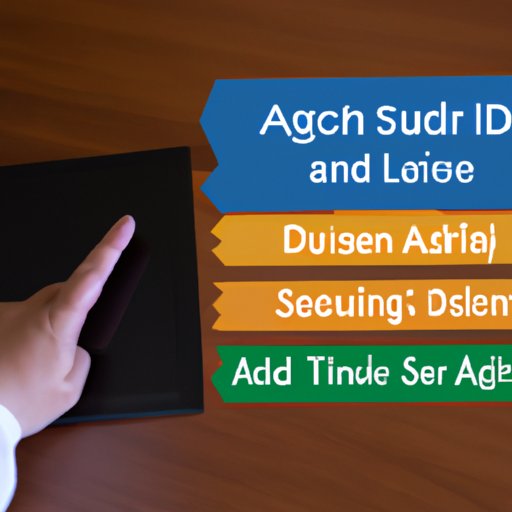
Introduction
ASD is a neurodevelopmental disorder that affects communication, social interaction, and behavior. It is estimated to affect approximately 1 in 54 children in the United States, and the prevalence continues to rise. As this population continues to grow, it is important to understand the impact of ASD on learning and to identify effective strategies to support individuals with ASD in academic settings.
The purpose of this article is to provide insight into the unique challenges and strengths individuals with ASD possess in a learning environment. It is intended for parents, educators, and anyone interested in learning more about how ASD affects the learning process.
The Unique Challenges Faced by Individuals with ASD in Learning Environments
Individuals with ASD can face a range of challenges in a learning environment. Some common challenges include difficulty with social interaction, communication, and sensory processing. They may struggle with understanding nonverbal cues, difficulty initiating and maintaining conversations, or may be overly sensitive to sensory input such as sound or touch. Additionally, individuals with ASD can exhibit repetitive behaviors or a restricted range of interests that can interfere with learning.
Furthermore, the learning process for individuals with ASD differs from that of neurotypical individuals. They may struggle with abstract concepts and have difficulty with interpreting social cues and understanding figurative language. Processing speed may be slower, and they may need more time to understand information presented to them.
The Strengths and Unique Learning Abilities that Individuals with ASD Possess
As challenging as the learning process can be for individuals with ASD, they also possess strengths and unique learning abilities. They often have strong pattern recognition and visual-spatial skills, which can lead to proficiency in areas such as music, math, and art. They can also have an extraordinary memory and recall of factual information, although they may struggle with understanding abstract concepts or generalizing information.
Additionally, individuals with ASD can have an intense focus and attention to detail, which can translate into exceptional problem-solving and analytical skills. This is especially true when they are interested in a topic, as they may become highly engrossed in it and be able to recall detailed information about it.
It is important to challenge the deficit-based thinking often associated with ASD and recognize the unique qualities and strengths these individuals possess. By building on their strengths and interests, educators and parents can help individuals with ASD reach their full potential.
The Importance of Early Identification and Intervention
Early identification of ASD is crucial for individuals with ASD and their families. Early intervention services, such as behavioral therapy, can help manage learning challenges and improve outcomes later in life. Studies have shown that early intensive intervention can lead to better social and cognitive outcomes, including improvements in language, communication, and adaptive behavior skills.
It is important for parents and educators to be aware of early signs of ASD, such as delays in speech and language development, difficulty with social interaction, and repetitive behaviors. Early identification and intervention can help individuals with ASD overcome many of their challenges and lead to improved outcomes in the long term.
The Impact of ASD on Learning and Statistics
The impact of ASD on learning can be significant, with studies showing that approximately 70% of individuals with ASD have learning difficulties. This can have a long-term impact on their academic, vocational, and social outcomes. Approximately 85% of individuals with ASD are either unemployed or underemployed, indicating the importance of addressing the learning challenges they face. Understanding the impact of ASD on learning can help parents and educators identify effective strategies for supporting individuals with ASD in academic settings.

Strategies for Educators to Support Learners with ASD in Their Classrooms
There are many practical tips and strategies that educators can use to support learners with ASD in their classrooms. One effective strategy is to provide clear and consistent expectations and routines, which can help individuals with ASD feel more comfortable and confident in their learning environment. Educators can also offer individualized education plans (IEPs) and accommodations, such as extra time on tests or breaks during class, to help manage learning challenges.
It is also important for educators to communicate effectively and clearly with individuals with ASD. This can include using clear and concise language, providing visual aids and examples, and breaking down complex concepts into smaller, more manageable pieces of information. Additionally, educators can incorporate the unique interests and strengths of individuals with ASD into their lessons, which can foster engagement and a love for learning.
The Role of Parents and Caregivers in Supporting the Learning of Children with ASD
Parents and caregivers play an important role in supporting the learning of children with ASD. They can provide a supportive and positive learning environment at home by creating routines and structure, encouraging communication and social interaction, and providing opportunities for their child to pursue their interests and talents. Additionally, parents can work with educators to create an individualized education plan and advocate for accommodations and resources that will help their child succeed in school.
There are also many resources available to parents and caregivers of children with ASD, including support groups, therapy services, and online communities. These resources can provide emotional support, guidance, and effective strategies for supporting their child’s academic and personal development.
Conclusion
ASD can have a significant impact on the learning process, but it is important to recognize the unique strengths and abilities that individuals with ASD possess. Early identification and intervention can help manage learning challenges and lead to improved outcomes in the long term.
By providing effective strategies and accommodations, educators and parents can support individuals with ASD in their academic pursuits. It is important to continue to educate ourselves on the impact of ASD on learning and to advocate for effective support and resources for individuals with ASD.





